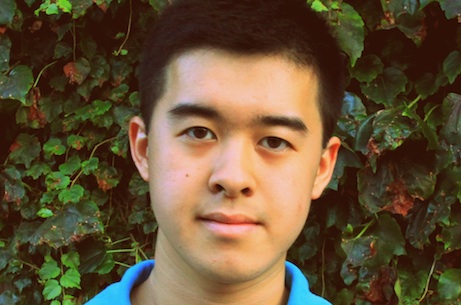
As an undergraduate Bo Shiun Lai's research on toxoplasmosis was published in a prestigious peer review journal and won him a national award. Now he plans to further that research.
Bo Shiun Lai experienced something most scientists take years to achieve – publication of his research in a leading journal – when he was still an undergraduate.
His research on toxoplasmosis was published in the Proceedings of the National Academy of Science. He was nominated for the Cozzarelli Prize, a national award for scientific excellence in a particular scientific discipline. Two other articles, on which he was not a first author, followed and yet another is under review, all before he has begun his PhD.
Toxoplasmosis is a parasite which is hosted by two billion people worldwide, mostly without any visible symptoms. However, if their immune system is suppressed, for instance, if they are newborn or have HIV, it can cause serious problems. In newborns it can cause ocular impairment or brain defects and brain inflammation caused by toxoplasmosis is a major cause of death in people with HIV. It is relatively rare among newborns and has been considered a neglected disease, but since 9/11, it has been classified as a bioterror agent by the US National Institute of Allergy and Infectious Diseases (NIAID) which led to increased interest until the financial meltdown.
Toxoplasmosis takes two forms: active and dormant. When it is dormant it wraps itself in a thick layer of lipid which makes it impervious to all drug treatment and impossible to eradicate.
Bo Shiun’s research into toxoplasmosis focuses on two main challenges: how to deliver drugs across the lipid barrier and what specific molecular pathways to inhibit. As toxoplasmosis mainly resides in the eyes and brain, treatment has to cross the ocular membrane or enter the brain. “We also don’t know the molecular pathways that turn the parasite on and off,” says Bo Shiun.
His research team looked at the first challenge. It attempted to create a molecule that could have an inhibitory effect on the parasite and deliver medication across multiple membranes.
Childhood
Although he was always interested in science, Bo Shiun has always been passionate about the arts.
At elementary school in Taiwan, he loved both the arts and science and took part in a lot of theatre activities, played drums in the school band and sang in the school choir. At the age of 11 he changed schools and a year later his family moved to Vancouver, Canada, for a better quality of life.
Bo Shiun found adapting to life in Vancouver difficult and said it took at least three years to get accustomed to it. “The language was different to start with, although I had started learning English two years before we moved. The education system was so different too and almost all my classmates in Canada knew one another beforeI arrived so it was difficult to make new friends,” he says.
He was bullied and thinks this was mainly because he was Taiwanese and many of the students were from China. The bullying got so bad that he transferred to another more academic school after a few years and thrived, taking the International Baccalaureate. This played to his love of a broad range of subjects. “I loved science and considered myself to be a humanities person at heart,” he says.
He chose the University of Chicago for his undergraduate studies primarily because of its liberal arts curriculum. This meant that he did not have to specialise immediately.
He decided to get involved in scientific research from early on in his undergraduate studies. In fact, he landed a research positition at the Toxoplasmosis Research Institute two weeks after arriving at Chicago. “I didn’t even know what toxoplasmosis was at the time, but I wanted hands on scientific experience to complement my coursework,” he says.
The lab work involved a huge time commitment throughout his undergraduate degree. “I think the vast majority of undergraduates would not have made the sacrifices I made. I spent a lot of Friday and Saturday evenings in the lab,” he says.
During his time in Chicago, he also found the time to volunteer for a year for Chicago’s main aquarium as a water quality technician, responsible for collecting testing water samples every Sunday. He says at the time he was considering becoming a veterinarian. He also worked at a free clinic for African American men in the impoverished South side called Project Brotherhood.
Bo Shiun begins his PhD in Pathology this autumn and plans to deal with the second challenge presented by toxoplasmosis – how to switch the parasite from dormant to active mode, making it susceptible to existing treatment, or shut off essential pathways, killing the parasite effectively. He says: “We know the parasite spits out lots of proteins that infect the host. I want to investigate what these secretory proteins do. Other research suggests they may be responsible for turning the parasite from dormant to active mode.”
He is very excited to have won a Gates Cambridge Scholarship. “More than a scholarship, to me it is about joining a community of scholars who are driven by the same mission of how they can apply their knowledge to the most critical problems facing the world,” he says.












